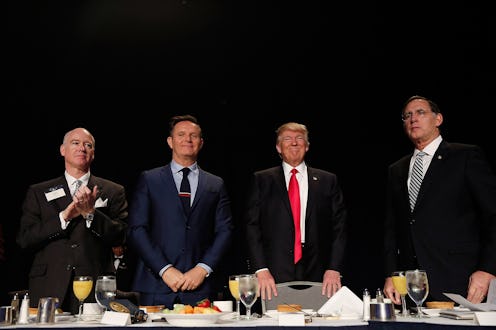News
Schwarzenegger Jab Wasn't Trump's Worst Comment

Many laughed at President Donald Trump when he used the National Prayer Breakfast, a tradition presidents have used to reach out to religious community leaders, to talk about himself and suggest people pray for Arnold Schwarzenegger since ratings for The Celebrity Apprentice are down. To a certain degree, people are right to laugh. It was hilarious in its own absurdity. But it's important to pay attention to something more substantive Trump said at the National Prayer Breakfast, as well.
The president reiterated a pledge he made briefly during the campaign — a desire to repeal the Johnson Amendment, which prohibits churches and other religious institutions from making political contributions or endorsing candidates. In his remarks, Trump said doing so would "allow our representatives of faith to speak freely and without fear of retribution.” He couched it in principles of religious freedom and free speech.
It's hard to tell what kind of result Trump's support might have. Repealing the Johnson Amendment has been floated by some leaders, but until this summer, had not been discussed as a high priority for Republican politicians. After the idea was put into the Republican platform this year and Trump discussed it in his convention speech, the move has been praised by some in the Christian right.
There are strong arguments for keeping the Johnson Amendment. Of course, there's the first and foremost insistence on separation of church and state that comes not only from the secular left but from many religious leaders, as well. Not only could issues like gay rights and reproductive rights be affected by the money and reach of religious organizations intervening directly in politics, but allowing religion to influence politics could, by necessity, also cause politics to infect religion, and create a situation where various religions could be in competition with each other over political issues.
But there's an even broader reason why repealing the Johnson Amendment could cause havoc in our politics. Beyond simply applying to churches, synagogues, and mosques, the law forbids any tax-exempt organization from endorsing or donating to political candidates. This means groups like universities, hospitals, and the Salvation Army are prevented from getting involved in politics.
Removing this barrier could mean massive upheaval to the political process. Citizens for Responsibility and Ethics in Washington, a non-profit (itself banned from political endorsement or donating to candidates) watchdog dedicated to good government, wrote after Trump discussed the concept that repealing the Johnson amendment "could open Pandora's Box for money in politics."
There are strict rules for how much people can spend on political candidates or political parties. However, several recent court decisions have lowered the barriers for outside groups to spend money in elections through not directly coordinating with the candidates. And through using loopholes about "social welfare" nonprofits, those interested have found ways to fund political campaigns with unlimited donations without disclosing their contributions.
Repealing the Johnson Amendment would turn those loopholes into full-blown openings. Considering that, according to a New York Times/CBS News poll, 84 percent of Americans said money has too much influence in politics in 2015, many may not approve of this potential move to allow that influence to increase.